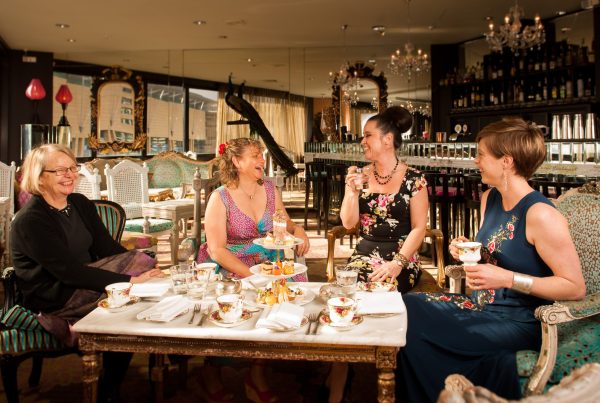
The title ‘physical education lecturer’ does sound like a bit of an oxymoron. Witnessing VUW’s Liz Thevenard splayed across a lectern in goggles and a swimming cap, demonstrating the elements of freestyle, makes it look a bit like one too. Thevenard’s love of movement is infectious, and when VUW’s Faculty of Education was still the Teachers’ College, she spent 40 hours a week teaching trainees in the gym and swimming pool, and on the sports field. University management have now reduced Thevenard’s job to ten hours per week of lecturing, favouring high-performance researchers over active teachers.
The government’s Performance-Based Research Fund (PBRF) sees New Zealand’s tertiary academic staff graded A, B, C or ‘R’ (inactive) according to research performance. These grades cumulatively determine both universities’ nationwide rankings and their share of the government’s $250 million PBRF pie. Staff categorised ‘R’, energetic Thevenards among them, do not boost rankings.
Thevenard believes that schoolchildren bear the brunt of the prioritisation of research performance in tertiary institutions. “I think in the next five years we will see the school systems in crisis,” she says, since the system does not enable sufficient hands-on upskilling of trainee teachers.
When the PBRF results were published this year, VUW ranked top, compared to fourth in 2006. It came first or second in 24 subject areas, compared to a previous 11. Understandably, this was exciting news for the university. Vice-chancellor Pat Walsh attributes the leap to “very, very hard work… People believed that this was vital to the future of the university and committed to it in a really quite remarkable way.”
According to governance and policy studies senior associate Dr Geoff Bertram, however, the ‘remarkable commitment’ to which Walsh refers wasn’t all above board: “Vic cooks its PBRF numbers,” he says. Tertiary Education Union (TEU) council member and immediate past president Dr Sandra Grey has confirmed publicly that “Universities have changed people’s employment agreements, restructured departments and people’s jobs, and in some cases made academics redundant.” This increases the proportion of high-performing staff on their books, meaning “they can appear higher on a rankings ladder than other universities”.

In light of this, Lally emailed chancellor Ian McKinnon in May asking him to resign. He signed off: “The University is entitled to be led by a person whose standards of behaviour are above reproach. It does not seem to me that you now satisfy that test. Resignation would be sensible.”
Between March and April 2012, the TEU handled similar cases from 28 institutions around the country. “Successful university administrations are under pressure to become skilled fraudsters,” says Bertram, “because that’s how you get PBRF money and that’s how you get promotions and bonuses. We pay our top executives now to be basically good at fooling people, rather than good at developing a culture of scholarship and maintaining a good position in the world community of scholarship.”
Bertram remembers a VUW that emphasised the latter: he was a student there in the 1960s. “We had a cafeteria where everybody went for dinner every night on the campus,” he says. “It was a seething hotbed of discussion and argument. Every week there was a soapbox forum outside the Student Union where hundreds of students congregated and debated the issues of the day. “That’s gone.” This is due to changes in government policy, he says, and the “ideological wet blanket [that] has come down over the universities”.

VUW now receives about 40 percent of its annual income from government grants. According to Walsh, today’s universities “can’t just expect the government to front up with $130 million a year… We have to demonstrate that the taxpayer is getting value for money, and therefore there are much stronger mechanisms of accountability.” Hence the PBRF.
Bertram has a second problem, though, with this system. “It’s stamped in favour of those subjects that really can demonstrate research performance, which is best done in science.” With restricted budgets, this means subjects “like history and philosophy, music, religious studies, serious sociology and good economics” are “starved of funding”.
Public policy professor Jonathan Boston lists VUW’s Philosophy, Biomedical, Physics and Chemistry schools among those that performed well in the first PBRF round. He says that well-established disciplines rank better than newer ones (like media studies) or those with strong clinical or professional practice components (like social work, nursing and clinical medicine).
When it comes to redistributing funds, Boston says universities do tend “to put the majority of money back where it is generated”. The PBRF funding model, says Bertram, is a Rogernomics design that puts universities under significant political pressure. “More and more,” he says, “the funding the government provides the universities is tagged to universities behaving themselves and doing things that the government wants them to do.” It is perhaps telling that VUW’s deputy vice-chancellor (research) Neil Quigley also chairs the board at VicLink, VUW’s commercial company, as well as one of VicLink’s current ventures, iPredict Ltd, which enables traders to buy and sell shares in future events.
The Education Act 1989 requires New Zealand’s universities to function as the critic and conscience of society, advancing learning through intellectual independence, quality research and teaching. According to Bertram, VUW, like the country’s other universities, “has systematically moved away from any engagement that might make it a really genuine critic or a really serious conscience… it allows two or three token Marxists to exist deep in sociology or anthropology or maybe philosophy, but it will not appoint and it will not promote people who have a critical approach to economic and social and legal systems in the key areas of power.”
When Bertram joined the academic staff in the 1970s, “We were engaged in social science for the benefit of the total community.” He says courses relating to workers, the history of economic thought, wage, income and wealth distribution and inequality were taught. Now, “that takes you into territory which is absolutely loathed by people who hold the power and the purse-strings in the New Zealand community,” he says. “Development issues, social justice issues, the operation of capitalism – if you want to teach economics in a university now and want to survive or have any sort of a career, you absolutely do not ask those questions.”
Walsh says part of demonstrating the university’s value to taxpayers means that, in large part, the value in studying humanities and social sciences lies in the skills gained for transfer into the workforce. He says VUW places “a very strong focus on graduate employability: are the graduates coming out of universities in New Zealand fit for purpose, if you like, to the world of work?”
Walsh echoes Canterbury senior economics lecturer Dr Eric Crampton’s belief that degrees have become a means of “signalling” attributes such as intelligence and time management to employers. Whilst this is obviously appropriate in part, this focus on employability over substance contributes to what Bertram observes as the gradual removal of invaluable course content from university programmes.
Once again, this can be viewed as a national challenge rather than one facing VUW alone. But in this climate, are degrees still worth the goatskin parchment – are VUW students still getting bang for their buck in the form of quality education?
There are some worrying signs.Tutor budgets were cut dramatically in 2009, and Bertram notes how poor pay rates and job insecurity has led to difficulty in retaining first-rate tutors. “There is a pastoral aspect to tutoring as well as a teaching aspect,” he says. “And if you don’t have the resources and the time to take a holistic approach to your teaching, you can’t do what tutoring is really about.”
International students are a lucrative revenue stream for VUW, but along with Māori and Pasifika students enrolling through the equity programme, they may suffer the most. Numerous tutors experience difficulty providing the extra literacy and learning support these students require, yet the university has course-completion targets for the quota of Māori and Pasifika equity students who are entitled to enrol despite not attaining the high school qualifications normally requisite.
According to one VUW lecturer, his faculty accepts fees from foreign students who struggle with English, “just to take their money. We’ve been asked to pass students whose literacy is atrocious. To give an idea of the scale of the problem, in a course I just taught in which over the half the class were international students, over half the class would have failed if literacy was taken seriously.
“We can’t fail them for language because it’s not their fault that they were let in, and they work so hard, but then our literacy standards are a complete joke.” In 2011, government cut the ‘bridging’ courses designed to equip international students for university.
One response to reduced tutor budgets and a difficult external financial environment is through technology: Walsh says implementation of the new digital learning strategy has begun. The university is exploring whether “courses, programmes, whole degrees will be provided online… [whether] the learning will be done online and the teaching will be done online, as opposed to in classrooms”. To what extent this strategy is driven by the necessity of cost-cutting rather than quality teaching is open for debate.

“So in the same way that the universities have to demonstrate that the public is getting value for money for the investment they make in universities,” says Walsh, “VUWSA need to demonstrate that it is providing value to students.” This puts them in a predicament. Last financial year saw VUWSA with a $15,000 deficit after receiving their annual grant from VUWSA Trust, and this year’s deficit is forecast to be even greater.
Some good news for VUW students came with the completion of the new student hub in Kelburn campus, a collaborative project between VUW and VUWSA Trust launched in March. The spacious new hub replaces the cold, old, windswept ‘quad’, which was partially sheltered and neither sunny nor study-friendly.
“A lot of student money was put into it – $4 million,” says McCourt. VUWSA Trust initially pledged $12 million to the upgrade; the remaining $8 million balance was to be paid over 15 years, with the option to withdraw following the financial blow of VSM. It is likely that the trust will exercise that option, but the university should be able to cover the cost. After VSM, they increased the student services levy by more than the lost VUWSA fee.
McCourt is delighted with the result. “The upgrade is wonderful,” he says. “It’s really well received by students; it’s given the university a heart again that students can really take some ownership over and appreciate as their space. It’s come out of a lot of hard work by students on the hub committees for years.” It includes plenty of seating for study, lunch and socialising, as well as bookshop VicBooks and food retailers.
While some are celebrating Victoria’s victories (many of them worthy), others, like Bertram, remain unconvinced: “Vic’s biggest aspiration now is to be a fourth-rate business school,” he says. “It’s given up trying to be a quality world-class university. We could aim much higher.”
Victoria is New Zealand’s number one university – but according to a broken measure now under review. This system of measurement itself contributes to nationwide pressure on universities to compete, cost-cut and commercialise. Although this pressure is in no way of VUW’s making, and there is no denying that much of what happens at our university is excellent, its response to these challenges has been telling. Wellington’s university needs to do better.
Ultimately, those choosing a university currently would be wise not to go weak at the knees over rankings. Carry out your own enquiry – choose your subject area, and look for a university that sports and supports its Bertrams and its Thevenards: strong, independent academic voices as well as quality coal-face teaching. That’s where you want to go, whether it’s to VUW or elsewhere.
[info]Speed reading: 10 fast facts
- The government’s Performance-Based Research Fund (PBRF) sees New Zealand’s tertiary academic staff graded A, B, C or ‘R’ (inactive) according to research performance. Grades cumulatively determine universities’ nationwide rankings, and rankings determine tertiary institutions’ share of the associated $250 million government fund.
- VUW ranked top this year, compared to fourth in 2006 (or sixth, depending on the measure: VUW rose in the ranks after a recalculation excluded R researchers). They came first or second in 24 subject areas, compared to a previous 11.
- The PBRF system gave universities an incentive to improve their rankings by manipulating employment contracts, removing staff less active in research from the payroll on the 14 June 2012 census date. Between March and April 2012, the Tertiary Education Union (TEU) handled 150 personal cases from 28 institutions nationwide.
- The Tertiary Education Commission (TEC) commissioned KPMG to carry out an audit of tertiary institutions’ PBRF practice. The resulting March 2012 report confirmed problems and ‘gaming’. The audit estimated that VUW had 690 PBRF eligible staff. Kiwiblog author David Farrar reported that VUW submitted 641.54 staff into the evaluation exercise.
- The PBRF is again under review. “I hope that this review and consultation on performance-based research funding will mean that good teachers and emerging researchers at universities can have more job security,” says former TEU national president Dr Sandra Grey.
- University enrolments increased approximately 385 percent between the 1960s introduction of the bursary system (which largely covered students’ fees and accommodation costs) and 1989. In 1989, fees rose as bursaries were replaced by student loans and allowances.
- The total New Zealand loan balance is now $13 billion, and loans have been interest-free since 2006. The 2013 budget included an increase in the student loan repayment rate and a tightening of student allowance eligibility. Student allowances are no longer available for postgraduate study.
- Tutor budgets were cut dramatically in 2009. VUW is under pressure to pass Māori and Pasifika equity students, as well as international students, despite literacy problems.
- Vice-chancellor Pat Walsh says VUW places “a very strong focus on graduate employability”. Canterbury senior economics lecturer Dr Eric Crampton believes that degrees have become a means of “signalling” attributes such as intelligence and time management to employers.
- VUW has 23,000 enrolled students. VUWSA president Rory McCourt says they need a representative “watchdog”. The passing of the Voluntary Student Membership (VSM) bill in 2011 made membership of VUWSA optional. Currently, 75 percent of VUW students are union members. VUWSA suffered a $15,000 deficit in 2012.






